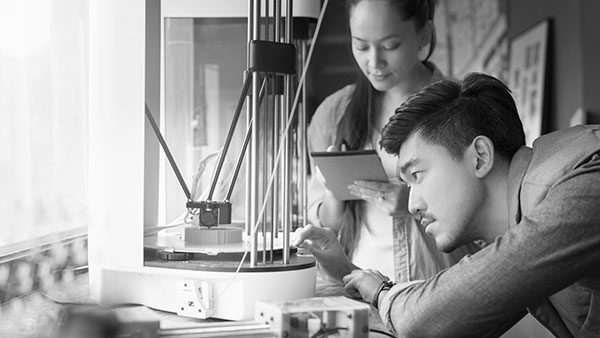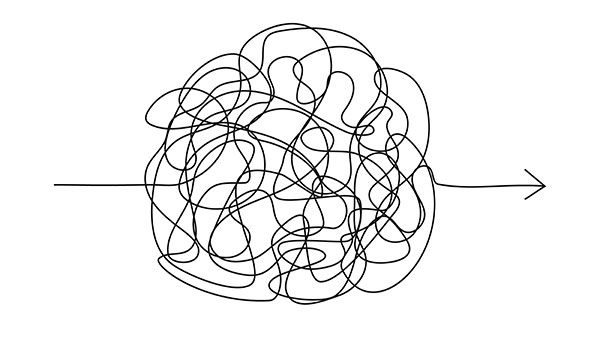Our world is undergoing a series of convulsions. We don't know where they'll end up, or where any of us will be when the dust settles, if it ever does. Will we have a job? A pension? A home? Someone to care for us in old age?
We do know we'll need to be more resilient, more adaptable, and more responsible to face the future. My particular concern is to join with those who are helping to grow fairer and more civilised communities and better places in which community can develop. In terms of the aims of the RSA, it's a concern that our arts, manufactures and commerce become more directly linked to the creation of a better and more equitable society.
In recent weeks I've been engaged in a series of conversations with others who are trying, in different ways, to do the same. The premise of those discussions has been that what has passed for social, economic or urban regeneration over the last decade needs to change.
Many of these conversations boil down to the same big issue: we need more intelligent ways of coping with structural changes in society. If we accept even the conservative views of the UK Industry Taskforce on Peak Oil, an oil-based commuter economy won't be tenable a decade or two from now. So why seek to achieve economic recovery through a £400m car scrappage scheme that encourages people to put new cars on the road, or promote speculative office developments people will have to drive to get to?
In the knowledge economy dog eats dog. The wisdom economy says dogs do better in packs
Over the last decade the political axiom has been that to gain competitive advantage in a globalised economy, the UK must increase its knowledge and skills. The knowledge economy - popularised by Charles Leadbeater's Living on Thin Air and Richard Florida's The Rise of the Creative Class - was one in which creative and digital industries would thrive, new technologies and business opportunities would flow from our world-class research institutions, and we would think our way to success. Implicit in that view was that the dirty work of making things would be outsourced across the globe.
But China and India and the rest turned out not just to be good at making things cheaply, but just as good as us at thinking and research and creating things. With limited capacity to make things in the UK and no obvious reason why our thinking should be considered superior to others', where does that leave our knowledge economy?
This is where a wisdom economy comes in. A wisdom economy doesn't ignore knowledge, but recognises that value is attached to the ethical and social framework within which that knowledge is used. Wisdom recognises that values and value-judgements are implicit in the way we live and that we need to be open about them.
So what might a wisdom economy feel like? Here are some suggestions.
The knowledge economy is innovative. The wisdom economy is reflective. Reflection doesn't displace innovation: but it asks what the purpose and end of the innovation will be. It stops to consider the consequences, and will sometimes place a higher value on inaction than on action as a result.
The knowledge economy wants more. The wisdom economy understands 'enough'. Wisdom knows that a person's life doesn't consist in an abundance of possessions. Wisdom understands prosperity as a state of sufficiency; knowledge without wisdom values only accumulation.
The knowledge economy demands qualifications. The wisdom economy insists on qualities first. Qualifications can be excellent, but don't make you a better worker or even a better thinker. From 2012 every nurse in England must have a degree. That will recognise their training and hard work, but won't create empathy with their patients. A wisdom economy will recruit for attitude as well as aptitude.
The knowledge economy is competitive. The wisdom economy is collaborative. In the knowledge economy dog eats dog. The wisdom economy says dogs do better in packs. It sees knowledge as something to be shared and built collaboratively. Where the knowledge economy is amoral - your disadvantage is of no concern as long as I am succeeding - the wisdom economy accepts at a profound level that your disadvantage is my problem.
The knowledge economy is grasping. The wisdom economy is gracious. This is perhaps the most important aspect, and one that conventional economic measures are unable to cope with. Forgoing a holiday to care for a sick relative, for example, is an economic negative: spending is taken out of the economy (both the spending on the holiday and the spending on professional care you might buy as an alternative to doing the caring yourself). Allowing an employee a second chance when they've failed doesn't necessarily add to GVA - you might never get the value back in monetary terms of the time you've put in to help them function effectively. Not doing the deal that's ethically suspect wins you no bonuses.
Too often this stuff gets put into the little black box called corporate social responsibility. That is neither wise nor responsible. A wisdom economy should regard all activity as either socially responsible and worth doing, or not socially responsible and therefore to be avoided.
In terms of regeneration, I see little value in encouraging people to spend money they don't have to buy stuff they don't need in order to impress people they don't like. A wisdom economy might see more value in community work, relationship-based activity that builds self-esteem as well as skills, and creating local products people are proud to make. It might see more value in the gradual improvement and reuse of places, working with the grain of local identity and character, rather than tearing down and putting up shiny new buildings.
A wisdom economy isn't yet another 'new economy'. But it could give us the tools to make better choices about the one we've got.
Julian Dobson FRSA is editorial director of New Start magazine
Related articles
-
Rapid prototyping is still just a printer
Jacob Strand
Jacob Strand asks whether rapid prototyping for domestic use is just another lingering homeless technology that will certainly not save us.
-
Developing human friendly, social AI
Mark Lee FRSA
Mark Lee FRSA, argues for developing AI with human styles of thinking
-
RSA Animate - The Power of Networks
In this RSA Animate, Manuel Lima senior UX design lead at Microsoft Bing, explores the power of network visualisation to help navigate our complex modern world. Taken from a lecture given by Manuel Lima as part of the RSA's free public events programme.



Join the discussion
Comments
Please login to post a comment or reply
Don't have an account? Click here to register.
Julian
Enjoyed your article and agrre very much with the sentiments. But, as demonstrated by John Montgomery, we need to work out a new form of leadership and new institutions in order to allow wisdom to flourish. I'm sure the leaders of the enlightenment would have been horrified had they lived to see the consequenses of their thinking. Many of us have been working below the radar in regeneration and related fields to try to bring forward, collaborative, empowering approaches to problems and to developing new ways of working for years. As I know you are well aware, though, the minute they appear on the radar they are cut down or over ridden by the dominant leadership and economic model. And even Obama had to go into that mode of operation to get healthcare through once his attempts at collaboration and consensus had been stymied. One of the great paradoxes seems to be that liberalism, which sees many sides and recognises shades of grey, come a cropper in the face of radicalism, whether from right or left, from religion or the military industrial complex. It is no accident that "knowledge is power"; how can we rescue wisdom?
This all sounds like lefty socialistic nonsense to me. In economic life in general (knowledge economy or otherwise) there are countless examples of collaboration as well as competition. It is impossible to trade with others without trust and mutual self-interest. Markets remain the most efficient way to produce, distribute and consume goods and services. Those who think markets produce things that people don't need should perhaps give your iPhones and iPods to charity. Or maybe stop using modern medicine. How is it more 'equitable' (and why is this a priority at all?) to deny Indians and Chinese and others the advantages of wealth creation that we have benefited from? The only way to reduce poverty is to create wealth. I might choose to consume less - I have pretty much all I need - but I can only do so because the wealth has already been created. Real wisdom would see the value in market economies, democracy and property rights, traditional social norms and manners - instead of bleating on about so-called 'equality'. What Smith, Adam, Wedgewood, Darwin, Boulton, Watt and the other fathers of the Enlightenment (and the RSA) would make of this might be amusing!
Matt, good points.
A brief response:
On point 1, it's hard to plan for unintended consequences. So I think you have to have a balanced judgement on the likely consequences. My point here is not that innovation should be avoided, but that it is not by definition better. Innovation too has unforeseen and unintended consequences, so we have to live with risk.
On point 2, I'm not sure wisdom is something that's arrived at through a decision-making process. Governments may be elected democratically with a mandate for what they do, but it may turn out that the electorate voted unwisely. What we ought to be able to do, though, is begin to understand why some decisions prove to be wise and others not, and tune our behaviour and decision-making processes accordingly. (It's a bit like the old saying that knowledge can tell you a tomato is a fruit, but wisdom tells you not to put it in a fruit salad).
3 You're absolutely right that collaboration isn't inherently good, it's what you collaborate on. But it's generally wiser to collaborate than not to collaborate, because it offers more chance of eliminating poor thinking and decision-making. Which is why it's better for me to address your objections than to hide behind everyone who agrees with me...
And finally, I completely applaud the sentiments of your last sentence.
I love this - insightful, considered and I completely agree. An added nuance is the fact that China is the future of the planet and they are famous for Confucius - the father of wisdom!
Julian, I am broadly in agreement with what you say, and pretty much on board with the shift you desire.
However, I worry about three things that a big overarching idea like 'wisdom economy' might paper over.
1. Unintended consequences - Innovation might have no purpose at times, but it may accidentally lead to great social benefit. Undue caution based on 'wisdom' might actually lead to worse outcomes rather than better.
2. Who decides what's 'wise'?
3. You say:
'The knowledge economy is competitive. The wisdom economy is collaborative. In the knowledge economy dog eats dog. The wisdom economy says dogs do better in packs. It sees knowledge as something to be shared and built collaboratively. Where the knowledge economy is amoral – your disadvantage is of no concern as long as I am succeeding – the wisdom economy accepts at a profound level that your disadvantage is my problem.'
But you yourself are wringing moral qualities out of an amoral term here: one can collaborate to build an atom bomb, or carry out a genocide. Collaboration is not inherently good. Why not just be more robust and say we want to see a more virtuous society where people are just, kind, generous and courageous?